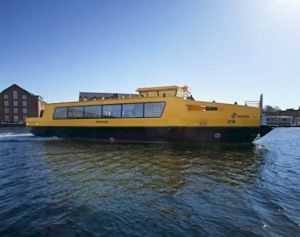News
Green harbour buses to cleanly connect Copenhagen
This article is more than 8 years old.
More popular than ever, current pollution levels deemed inadequate for capital’s image

They’re popular, but not green enough (photo: Movia)
Last year, Copenhagen’s yellow harbour buses were more popular than ever before with a record 885,000 passengers hopping on the nine-stop trip across the city harbour.
But the harbour ferries are terrible polluters, so the city has decided to replace them with more environmentally-friendly models.
“The harbour buses are super popular and help connect the city and make it easier to get around the harbour,” said the city mayor, Frank Jensen.
“But they fit poorly with Copenhagen’s green image as they pollute and damage the environment.”
READ MORE: Copenhagen harbour buses are big polluters, figures show
Ready by 2020
The four harbour buses in service make up a whopping 15 percent of all the NOx and 65 percent of all the particles released by Movia’s bus routes – 33 road buses plus the harbour buses.
The decision comes in the wake of a Copenhagen Municipality decision last year that all bus lines in Copenhagen will be exchanged for electric buses over the coming years. That’s expected to save about 37,000 tonnes of CO2 from being released annually, as well as to reduce the noise, NOx and particle pollution.
The cost of the new harbour buses is expected to be in the 10-20 million kroner price range and the city wants to glean the experience of other Nordic nations, where clean ferries are also becoming more prevalent. The green harbour buses are scheduled to be ready for action sometime in 2020.
“Limiting air pollution in Copenhagen so that children and adults can breathe deeply and freely is a key issue for me,” Jensen added.










































